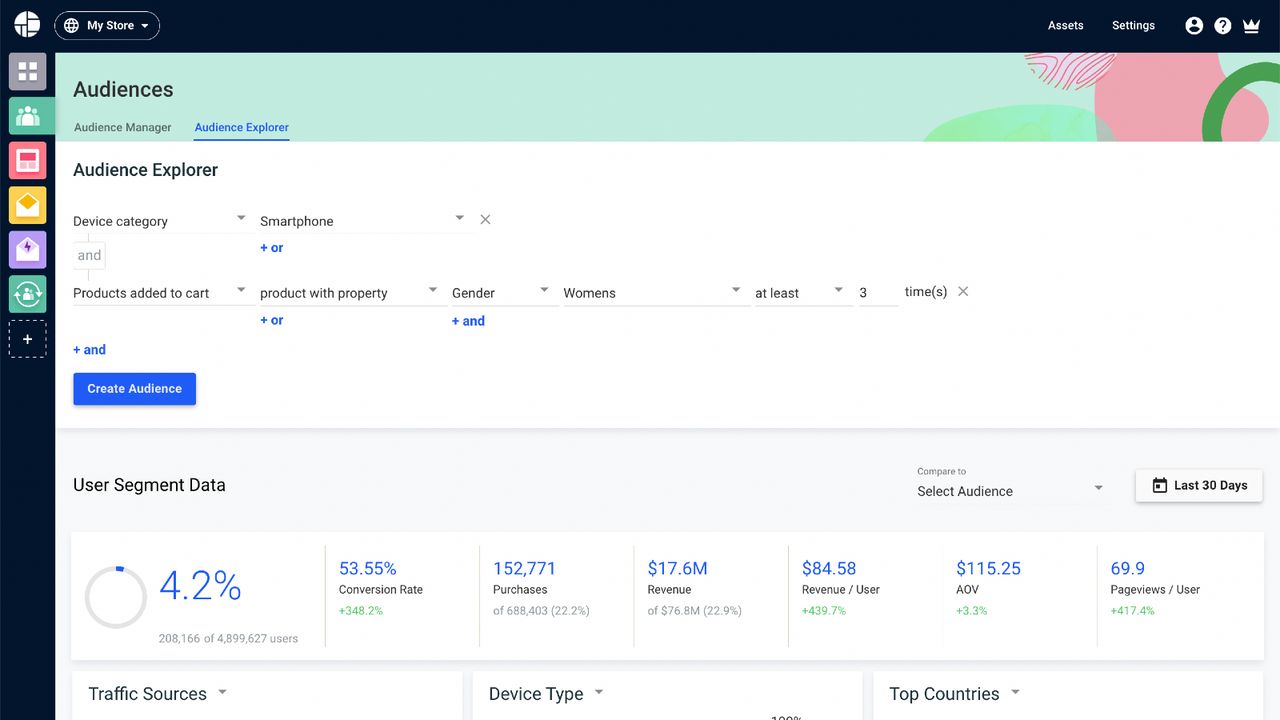Alternatives to OneClickUpsell
1. Dynamic Yield
+Pros
- Real-time targeting capabilities and A/B testing workflows
- Integration with Mastercard's data ecosystem providing unique behavioral insights
-Cons
- Implementation complexity requiring substantial technical integration and planning phases
- Custom-quoted pricing model lacking transparency
One highlighted feature and why it's amazing
Dynamic Yield's primary capability centers on real-time behavioral analytics and predictive targeting, enabling personalized experiences across customer touchpoints through machine learning algorithms that analyze visitor behavior patterns to deliver dynamic content recommendations.

Another highlighted feature of why it’s amazing
The platform's unique differentiator lies in its Predictive Spend Insights capability, which leverages Mastercard's extensive transaction data for geo-based behavioral modeling.
2. LimeSpot
+Pros
- Deep platform integration capabilities with Shopify and BigCommerce
- Real-time behavioral analysis and machine learning algorithms provide continuous optimization
- Proven performance capabilities with measurable business impact
-Cons
- Data quality dependencies require clean product attributes and sufficient behavioral data for optimal performance
- Enterprise pricing opacity creates budget planning challenges for larger organizations
- Platform limitations restrict appeal to businesses using Shopify or BigCommerce exclusively
One highlighted feature and why it's amazing
Generates dynamic product recommendations, personalized discounts, and trending product grids based on real-time customer behavior analysis.

Another highlighted feature of why it’s amazing
Enables businesses to target audiences by demographics, purchase history, and browsing patterns.
3. Optimizely Configured Commerce
+Pros
- Comprehensive B2B functionality including quote management, approval workflows, and bulk ordering capabilities .
- Proven customer outcomes with documented performance improvements .
- AI-powered personalization delivering real-time behavioral analysis and predictive analytics capabilities .
- Ecosystem integration with Optimizely's broader digital experience suite .
-Cons
- Data quality dependencies can reduce recommendation accuracy by 20-30% .
- Implementation complexity requires substantial organizational commitment .
- Cost barriers limit accessibility for smaller organizations .
- Competitive limitations in composable architecture flexibility .
One highlighted feature and why it's amazing
Delivers real-time behavioral analysis, processing browsing history, purchase patterns, and user interactions to generate personalized product recommendations and dynamic pricing adjustments .
Another highlighted feature of why it’s amazing
Includes quote management systems, approval workflows, and bulk ordering capabilities specifically designed for complex organizational purchasing processes .
Other Alternatives
Rebuy
VWO
How We Researched This Guide
About This Guide: This comprehensive analysis is based on extensive competitive intelligence and real-world implementation data from leading AI vendors. StayModern updates this guide quarterly to reflect market developments and vendor performance changes.
411+ verified sources per analysis including official documentation, customer reviews, analyst reports, and industry publications.
- • Vendor documentation & whitepapers
- • Customer testimonials & case studies
- • Third-party analyst assessments
- • Industry benchmarking reports
Standardized assessment framework across 8 key dimensions for objective comparison.
- • Technology capabilities & architecture
- • Market position & customer evidence
- • Implementation experience & support
- • Pricing value & competitive position
Research is refreshed every 90 days to capture market changes and new vendor capabilities.
- • New product releases & features
- • Market positioning changes
- • Customer feedback integration
- • Competitive landscape shifts
Every claim is source-linked with direct citations to original materials for verification.
- • Clickable citation links
- • Original source attribution
- • Date stamps for currency
- • Quality score validation
Analysis follows systematic research protocols with consistent evaluation frameworks.
- • Standardized assessment criteria
- • Multi-source verification process
- • Consistent evaluation methodology
- • Quality assurance protocols
Buyer-focused analysis with transparent methodology and factual accuracy commitment.
- • Objective comparative analysis
- • Transparent research methodology
- • Factual accuracy commitment
- • Continuous quality improvement
Quality Commitment: If you find any inaccuracies in our analysis on this page, please contact us at research@staymodern.ai. We're committed to maintaining the highest standards of research integrity and will investigate and correct any issues promptly.